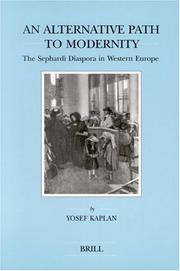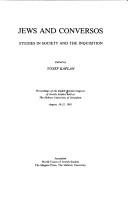| Listing 1 - 10 of 21 | << page >> |
Sort by
|

ISBN: 9004117423 9004500944 Year: 2000 Volume: 28 Publisher: Leiden Brill
Abstract | Keywords | Export | Availability | Bookmark
 Loading...
Loading...Choose an application
- Reference Manager
- EndNote
- RefWorks (Direct export to RefWorks)
History of Europe --- Jewish religion --- anno 1500-1799 --- Sephardim --- Europe [Western ] --- History

ISBN: 9652236071 9789652236074 Year: 1985 Publisher: Jerusalem : The Hebrew University, Magnes Press,
Abstract | Keywords | Export | Availability | Bookmark
 Loading...
Loading...Choose an application
- Reference Manager
- EndNote
- RefWorks (Direct export to RefWorks)
Jews --- Marranos --- Juifs --- History --- Congresses. --- Histoire --- Congrès --- Spain --- Portugal --- Espagne --- Ethnic relations --- Relations interethniques --- Congrès --- Crypto-Jews
Book
ISBN: 9781443895804 1443895806 Year: 2017 Publisher: Newcastle upon Tyne Cambridge Scholars Publishing
Abstract | Keywords | Export | Availability | Bookmark
 Loading...
Loading...Choose an application
- Reference Manager
- EndNote
- RefWorks (Direct export to RefWorks)
"In the Early Modern period, the religious refugee became a constant presence in the European landscape, a presence which was felt, in the wake of processes of globalization, on other continents as well. During the religious wars, which raged in Europe at the time of the Reformation, and as a result of the persecution of religious minorities, hundreds of thousands of men and women were forced to go into exile and to restore their lives in new settings. In this collection of articles, an international group of historians focus on several of the significant groups of minorities who were driven into exile from the sixteenth to the eighteenth centuries. The contributions here discuss a broad range of topics, including the ways in which these communities of belief retained their identity in foreign climes, the religious meaning they accorded to the experience of exile, and the connection between ethnic attachment and religious belief, among others"--back cover.
History of Europe --- Christian church history --- anno 1600-1699 --- anno 1500-1599 --- Religious refugees --- Refugees, Religious --- Refugees --- History --- Religious refugees. --- 1500-1599. --- Europe.
Book
ISBN: 9004392483 9004367535 Year: 2019 Publisher: Brill
Abstract | Keywords | Export | Availability | Bookmark
 Loading...
Loading...Choose an application
- Reference Manager
- EndNote
- RefWorks (Direct export to RefWorks)
From the sixteenth century on, hundreds of Portuguese New Christians began to flow to Venice and Livorno in Italy, and to Amsterdam and Hamburg in northwest Europe. In those cities and later in London, Bordeaux, and Bayonne as well, Iberian conversos established their own Jewish communities, openly adhering to Judaism. Despite the features these communities shared with other confessional groups in exile, what set them apart was very significant. In contrast to other European confessional communities, whose religious affiliation was uninterrupted, the Western Sephardic Jews came to Judaism after a separation of generations from the religion of their ancestors. In this edited volume, several experts in the field detail the religious and cultural changes that occurred in the Early Modern Western Sephardic communities.
Jews --- Sephardim --- History --- Europe, Western --- Ethnic relations --- Jews, Sephardic --- Ladinos (Spanish Jews) --- Sefardic Jews --- Sephardi Jews --- Sephardic Jews --- Jews, Portuguese --- Jews, Spanish --- Hebrews --- Israelites --- Jewish people --- Jewry --- Judaic people --- Judaists --- Ethnology --- Religious adherents --- Semites --- Judaism --- West Europe --- Western Europe
Book
ISBN: 1527504301 9781527504301 1443895806 9781443895804 Year: 2017 Publisher: Newcastle upon Tyne, England : Cambridge Scholars Publishing,
Abstract | Keywords | Export | Availability | Bookmark
 Loading...
Loading...Choose an application
- Reference Manager
- EndNote
- RefWorks (Direct export to RefWorks)
Religious refugees --- Refugees, Religious --- Refugees --- History --- 1500-1599 --- Europe. --- Council of Europe countries --- Eastern Hemisphere --- Eurasia
Book
ISBN: 8474325730 Year: 1996 Publisher: Barcelona Gedisa
Abstract | Keywords | Export | Availability | Bookmark
 Loading...
Loading...Choose an application
- Reference Manager
- EndNote
- RefWorks (Direct export to RefWorks)
Jewish religion --- anno 1600-1699 --- Amsterdam
Book
Year: 1975 Publisher: Place of publication unknown publisher unknown
Abstract | Keywords | Export | Availability | Bookmark
 Loading...
Loading...Choose an application
- Reference Manager
- EndNote
- RefWorks (Direct export to RefWorks)
Book
ISBN: 9789004500945 9789004117426 Year: 2000 Publisher: Leiden; Boston : BRILL
Abstract | Keywords | Export | Availability | Bookmark
 Loading...
Loading...Choose an application
- Reference Manager
- EndNote
- RefWorks (Direct export to RefWorks)
The essays in this volume deal with the social and intellectual history of the Western Spanish and Portuguese Jews who established new communities in Northwestern Europe during the seventeenth century. The founders of these communities were mainly former Marranos , descendants of those Jews who had converted to Christianity in the closing years of the Middle Ages. After being separated from the Jewish world for many generations, they returned to Judaism and became an integral part of the Sephardi nation. Amsterdam became the metropolis of this new Jewish diaspora, which was characterised by both its involvement in colonial trade and its intellectual ferment. The reencounter of these Jews with Judaism was a complex affair, and for many of these former New Christians rabbinic Judaism aroused harsh criticism. In order to set the boundaries of their new identity, the leadership of the Sephardi communities of Amsterdam, Hamburg and London adopted a variety of strategies designed to rein in these wayward spirits. This process of socialisation into the Jewish world created a new type of Judaism, and those whose Jewish life was framed by this new amalgam can be considered the precursors of modernity in European Jewish society.
Article
Year: 1985
Abstract | Keywords | Export | Availability | Bookmark
 Loading...
Loading...Choose an application
- Reference Manager
- EndNote
- RefWorks (Direct export to RefWorks)
Book
ISBN: 9789004343153 Year: 2017 Volume: 58 Publisher: Leiden Brill
Abstract | Keywords | Export | Availability | Bookmark
 Loading...
Loading...Choose an application
- Reference Manager
- EndNote
- RefWorks (Direct export to RefWorks)
History of the Netherlands --- Jewish religion --- anno 1500-1799 --- anno 1800-1999
| Listing 1 - 10 of 21 | << page >> |
Sort by
|

 Search
Search Feedback
Feedback About UniCat
About UniCat  Help
Help News
News